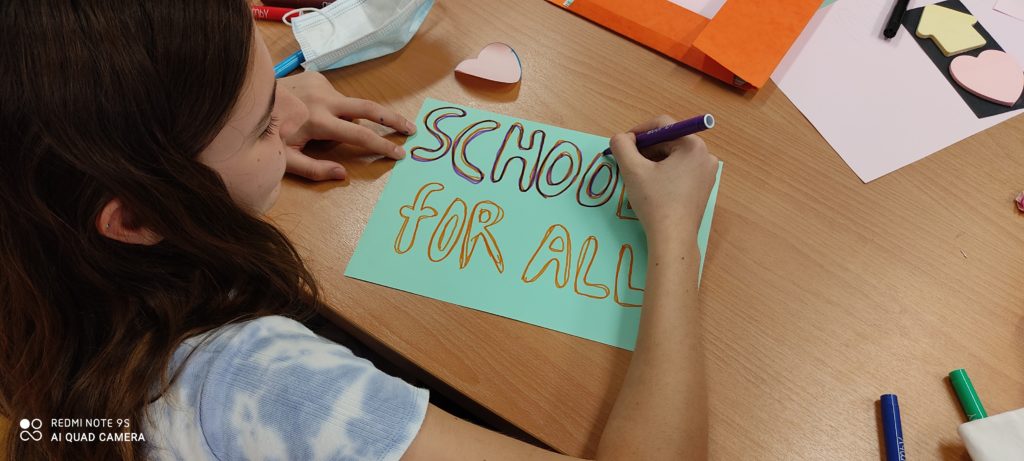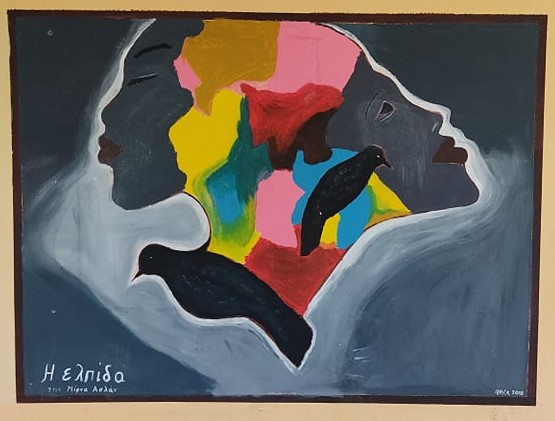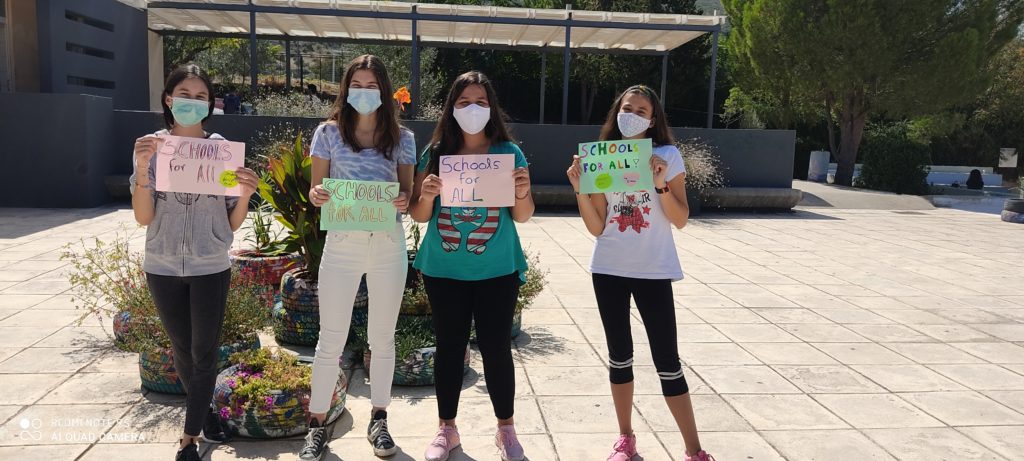Students and staff at the 1st Gymnasium of Avlona faced Covid-19 as a big family. The biggest challenge when Greek schools closed down in early March was making it possible for the refugee children in the camps to take part in the online courses and feel included and welcome.

When Greek schools closed their doors in an attempt to control the covid-19 pandemic, teachers had to almost overnight move their classrooms online. With over 13 000 refugee students enrolled in schools around the country, school leaders and teachers faced an added challenge of ensuring the inclusion of a vulnerable group that often lack the basic necessities to access online education.
“While the government quickly announced that they would provide online classes to ensure students’ continued learning, it was also clear that they faced several challenges to be able to do so”, says EWC coordinator Dora Katsamori. “The level of digital competences among teachers, the schools’ ability to deliver online courses, the socio-psychological effects on students having to be isolated, as well as people’s access to necessary equipment at home were all issues that were, and are still not, easily solved”, she explains.
As one of 18 Greek schools that participated in the piloting phase of the EWC project “Schools for All – Integration of Refugee children in Greek Schools” at the time of the school lockdowns, the 1st gymnasium of Avlona involved the whole community when working to ensure that all students received the necessary support for continued learning.
Both staff and students express a feeling of belonging to a “big family” through their school community, something that played an integral part in how they dealt with the lockdown. “This was a whole school and community effort. Where students lacked internet access, teachers joined together to apply for sponsorships covering the costs to ensure that they could get online, and where some did not have laptops at home people came together to lend out the necessary equipment”, teacher and deputy head, Annie Kiek says. “The teachers that struggled with adjusting to a digital mode of teaching were supported by colleagues that felt more confident using digital platforms”, she explains.
The staff quickly made use of the technology that was already available to them. “Realizing the students´ need to be able to communicate with us and each other, we set up class-groups through channels like Viber, enabling easy access for sharing of information”, recalls the principal, Ms. Nantia Tsene. “One week after the official lockdown, on world poetry day, we were ready to start piloting the first online courses in literature”, she continues.
As one of the teachers participating in the “Schools for all” project, Ms. Loukia Stefou felt a personal obligation to provide the necessary support to ensure that the refugees still felt included and welcome in the online classrooms. “Our biggest challenge during this time was making it possible for the refugee children in the camps to take part in the online courses. Lack of access to computers and internet, as well as dealing with feelings of isolation made it challenging to keep them engaged in everyday school activities. We were very happy to hear that online participation and being able to interact with the school community helped many withstand the tough period of lockdown”, Stefou continues.

As schools reopened in mid-September the Greek government made it clear that in case of a new lockdown schools should be the last to be affected. “Despite the quick distribution of guidelines and piloting of online courses to certain student groups, schools still need adequate support in order for them to adjust to the new situation and provide quality education to all students”, says EWC project coordinator Dora Katsamori. “The teachers at the 1st Gymnasium of Avlona leaned on each other and the community to find new and innovative ways to help their students continue learning in an unprecedented situation, demonstrating the importance of a whole school approach”, she continues. “With the possibility of new lockdowns and the normalization of online spaces for learning, we have to remember to include these in our aim of creating safe and inclusive classrooms that are open to all”, Katsamori adds.

“Schools for All” is a three-year national capacity building project which supports Greek schools with reception classes, training school directors and teachers to create safe and inclusive schools and classrooms where refugees are welcomed into a learning environment that provides quality education to all. Every school follows an action plan customized to their specific situation, which involves teachers, school management, students and parents through a whole school approach.
“As a school that encourages diversity and with an aim of equal integration of all students, we are very happy to be a part of “Schools for All”. Not only does it reinforce our inclusive culture, but we, as teachers and citizens, gain valuable experience in keeping up our mission of a democratic and open school”, concludes principal Tsene.
“Schools for All – Integration of Refugee Children in Greek Schools” is conducted in partnership with the Hellenic Ministry of Education And Religious Affairs and financed by the EEA Grants, fund operated by ΣΟΛ Crowe & HumanRights360.